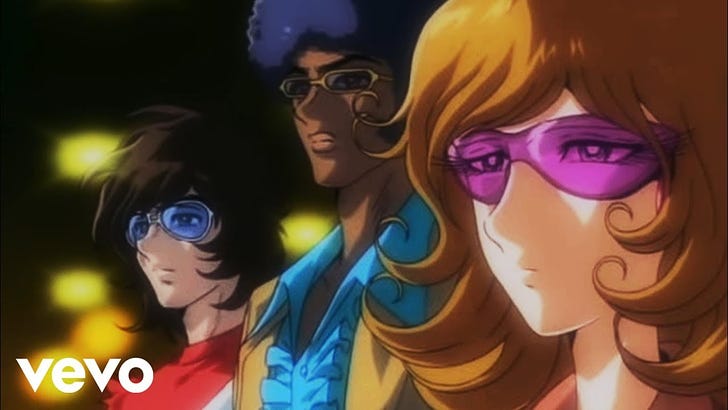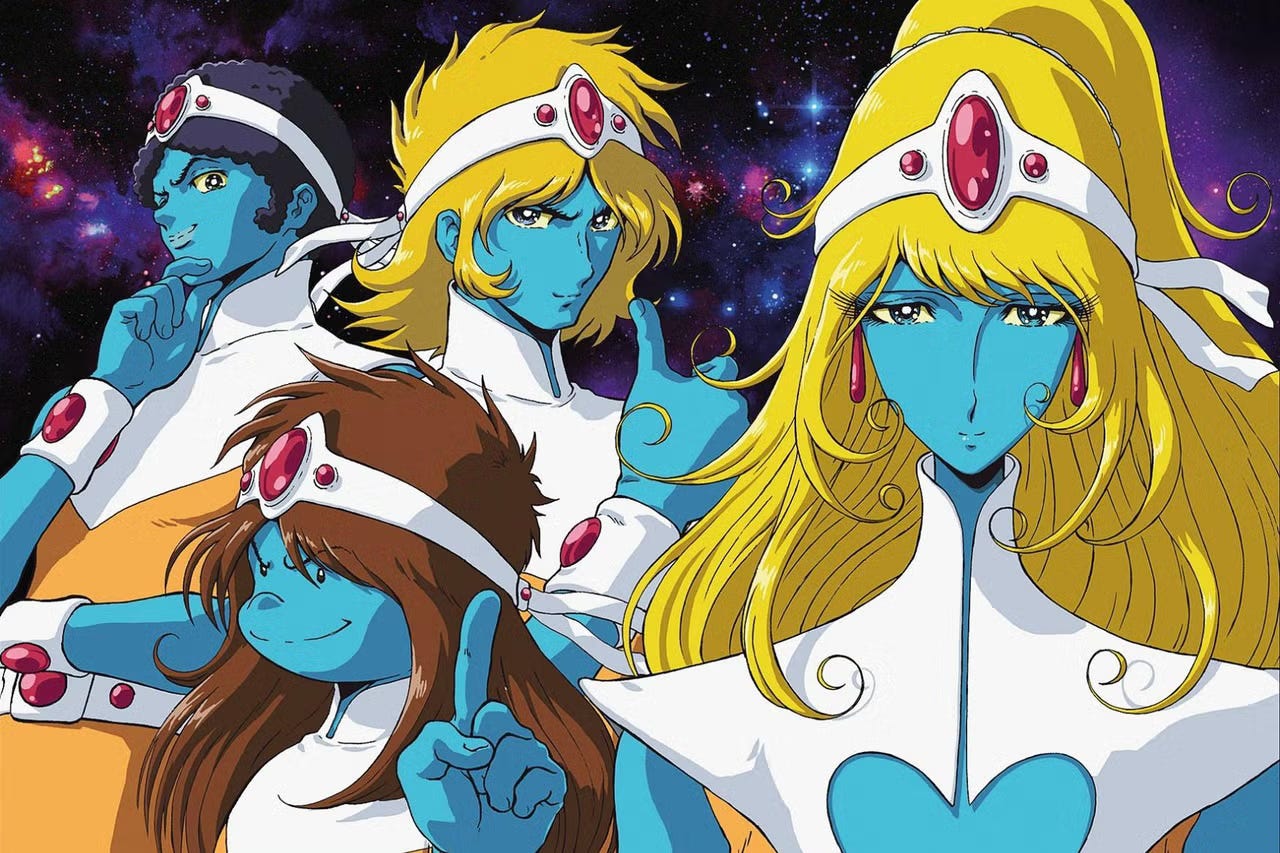The only thing that I have found is infinite is people’s endless desire for more – in the words of Daft Punk, Harder, Better, Faster, Stronger. Behold, the peak of philosophy.
The 1980’s style anime characters in the video are built for purpose. Presumably kidnapped from their alien world with their artifacts taken and memories edited, they are then given new human appearances, painted on top of their blue skin and strange hair, their looks selected for maximum marketability and good work. What appears to be an AI chooses their fashion from an infinite number of looks, figures out their music, and spits them out in front of an executive, ready to make him a lot of money.
This almost seems quaint. Why do we bother with the farce of making them human when the AI already knows what will sell and can match people exactly to that? Why not raise regular humans from the start and turn them into entertainment Manchurian Candidates, raising them from birth to be perfectly profitable pop stars? We already have huge teams behind artists that help compose, write, and produce their songs and music videos, with the performer being the tip of the iceberg it takes to make a sensation. The whole “kidnapping aliens” bit seems to be a complete waste of time.
As you may have inferred, I don’t think so. Starting with an alien is a deliberate symbolic choice, and I think the answer is pretty simple.
You can’t get a larger-than-life product from a regular-life feedstock.
Think about it. Real stars fill the room with their presence and give the media plenty of wild stories to talk about them. Their idiosyncrasies and strange habits, the consequences of their extreme dedication to the performing arts and their ideas of how they should act and who they should be, one thing is for sure – their reputations and quirks become larger than life. Some examples:
· Steve Jobs did it for Apple. Inventing the role of the eccentric tech maverick with his focus on user experience and his love of calligraphy influencing his design, he was a charismatic figure who left his mark on the tech world before he died.
· Elizabeth Holmes tried to copy him. She aped his black sweatshirt, trained herself to do a deep voice, and convinced luminaries in their fields that Theranos would revolutionize blood testing, taking only a drop to do a battery of lab tests – until it all came crashing down.
· Musicians are famously troubled – Michael Jackson, with his allegations and death under mysterious circumstances, The Beatles breaking up with many of their fans blaming Yoko Ono, but I want to bring up a less common example. Chistopher Cornell, vocalist of Audioslave and Soundgarden, bands that at one time ruled alt rock. He was always an odd kid from a troubled family, struggling with isolation, drug addiction, and depression as he grew up and worked with his first wife and manager. He was all about his conviction. In one famous incident, his fans loved his curly afro, so he cut it all off in order to be known for his music. He would later divorce his first wife and marry again, leading to a difficult inheritance situation after he killed himself.
Looked at from a “normal” lens, these people are misfits, freaks, outliers, and weirdoes. One might even say creeps. And yet, we follow them. Actors on television have their rises and falls documented by gossip columns, tabloid newspapers, and the paparazzi. Obsessed stans stalk their favorite K-pop groups on social media, stalking, reposting obsessively, and even breaking security to get close to them. Politicians gain great followings simply by giving soundbites for the camera and espousing positions they were against just a few years – even months – ago. In the eyes of the people, these larger than life figures are societal lightning rods, either doing no wrong or everything wrong.
Why are we like this?
Why we are like this.
This is a normal feature, not a bug. In order to survive we have always worked in groups under leaders who make decisions that speed everything up. Respect for and some idolization of the leader allows us to adapt and survive. This creates a paradoxical idea of the leader – they are human like us, but they are also more – which needs to be satisfied, usually by attributing exaggerations and larger-than-life traits to them to explain how they can do things that we cannot.
In a world increasingly governed via predictive algorithm based on qualifications and rules we cannot touch base with, our leaders become lightning rods and focal points. Deprived of the ability to use human judgment and empathize with the ATM, the call center employee forced to work out of a book, or the crushing reality of automated resume sorting systems, we crave empathy and the human touch. We devour fiction and philosophy, get involved in political action, become obsessed with artists and share in their struggles, form parasocial relationships with streamers – for what?
To feel fucking human in an increasingly inhuman world.
Naturally, since human desire is infinite, once we have it, we need more of it. More bombastic and radical politicians gain traction and attention, polarizing the electorate who wants to get in on the brawl. Artists and streamers form parasocial relationships that can evolve into cults of personality, pushing their schtick as far as it will go for the superchats and the Twitch donos. Start ‘em young and make ‘em customers for life – just look at MrBeast’s business model of wacky videos for kids to click on and merch to buy on their parents’ credit card.
These people distill the secret sauce of becoming more than a man, but a brand – appearing larger than life and more than human – and inject massive doses of it through our screens and into our brains, all to compensate for the lack of humanity we feel in our daily lives. Government offices, large corporations, rules and regulations – these things are immovable, inhuman iron walls, slowly closing in and restricting our lives. The screen, with all the larger-than-life figures on it, is our escape.

What to do about it.
Try something you haven’t done before. Snap your regular routines in half, chipping away at your chains task by task. Get the fuck off the Internet and do something in real life, where there’s variability rather than the silicon corridors of tech. Make some friends. Drag the human back into your life – even more so if you’ve got a high-power job with more rules than you’ll ever know. With the all-pervasive feeling that the walls are closing in around us, sucking the air and vitality out of our lives, these steps are more important than ever.
Life is meant to be lived, not survived.





Amen. LIfe is indeed meant to be lived, not merely survived. It certainly feels like a shift is needed. Were humans ever living life? Or were they always merely surviving?
I have been asking myself questions along with this line for awhile now. How can I filter out the unnecessary demands of modern life (that is, the demands that come through media primarily)? It's not an easy task. Thanks for a thoughtful read.